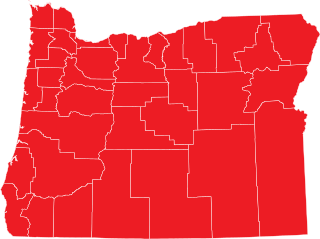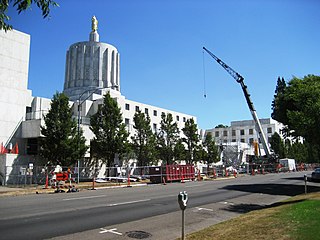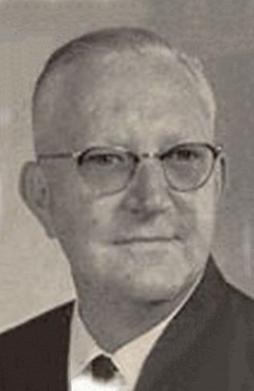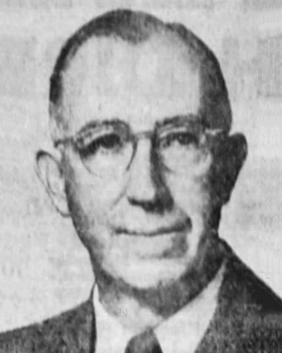
The Colorado General Assembly is the state legislature of the State of Colorado. It is a bicameral legislature consisting of the Senate and House of Representatives that was created by the 1876 state constitution. Its statutes are codified in the Colorado Revised Statutes (C.R.S.). The session laws are published in the Session Laws of Colorado.

The Colorado State Senate is the upper house of the Colorado General Assembly, the state legislature of the US state of Colorado. It is composed of 35 members elected from single-member districts, with each district having a population of about 123,000 as of the 2000 census. Senators are elected to four-year terms, and are limited to two consecutive terms in office. Senators who are term-limited become eligible to run again after a one-term respite.

The Tennessee General Assembly (TNGA) is the state legislature of the U.S. state of Tennessee. It is a part-time bicameral legislature consisting of a Senate and a House of Representatives. The Speaker of the Senate carries the additional title and office of Lieutenant Governor of Tennessee. In addition to passing a budget for state government plus other legislation, the General Assembly appoints three state officers specified by the state constitution. It is also the initiating body in any process to amend the state's constitution.

The Oregon Legislative Assembly is the state legislature for the U.S. state of Oregon. The Legislative Assembly is bicameral, consisting of an upper and lower house: the Senate, whose 30 members are elected to serve four-year terms; and the House of Representatives, with 60 members elected to two-year terms. There are no term limits for either house in the Legislative Assembly.

Oregon ballot measure 48 was one of two unsuccessful ballot measures sponsored by the Taxpayers Association of Oregon (TAO) on the November 7, 2006 general election ballot. Measure 48 was an initiated constitutional amendment ballot measure. Oregon statute currently limits state appropriations to 8% of projected personal income in Oregon. If Governor declares emergency, legislature may exceed current statutory appropriations limit by 60% vote of each house. This measure would have added a constitutional provision limiting any increase in state spending from one biennium to next biennium to the percentage increase in state population, plus inflation, over previous two years. Certain exceptions to limit, including spending of: federal, donated funds; proceeds from selling certain bonds, real property; money to fund emergency funds; money to fund tax, "kicker," other refunds were included in the provisions of the measure. It also would have provided that spending limit may be exceeded by amount approved by two-thirds of each house of legislature and approved by majority of voters voting in general election.

The Seventy-fourth Oregon Legislative Assembly was the Oregon Legislative Assembly (OLA)'s period from 2007 to 2008. There was a regular session in 2007, and a shorter special session in 2008.

The 75th Oregon Legislative Assembly convened beginning on January 12, 2009, for its biennial regular session. All of the 60 seats in the House of Representatives and half of the 30 seats in the State Senate were up for election in 2008; the general election for those seats took place on November 4.

The Budget of the State of Oklahoma is the governor's proposal to the Oklahoma Legislature which recommends funding levels to operate the state government for the next fiscal year, beginning July 1. Legislative decisions are governed by rules and legislation regarding the state budget process.

Benjamin M. Musa was an American politician who served four terms in the Oregon State Senate between 1949 and 1968, including serving as President of the Oregon Senate during the 1963–1964 legislative term. A CPA, he was a conservative Democrat from a rural district, known for his ability to work with Republicans as well as fellow Democrats in the state senate. Musa ran for governor in 1966, but lost the Democratic primary to Robert W. Straub.

Edward Andrew Geary was an American politician and farmer from the state of Oregon. He was a Republican who served eight years in the Oregon House of Representatives. In the house, Geary represented a large rural district in southern Oregon. He served as Speaker of the Oregon House of Representatives during the 1955 legislative session. He also served as acting governor of Oregon for several brief periods in the mid-1950s.

Henry Semon, also known as Hank Semon, was a potato farmer and politician from Oregon. He served twelve terms in the Oregon House of Representatives, making him one of the longest serving members of that body. A conservative Democrat from a rural district, Semon was known for his ability to work with Republicans in the state legislature. As a result, he served as chairman of the powerful ways and means committee for nine terms, serving in that position under both Democratic and Republican majorities. He was also an innovative farmer, who brought a new potato variety into common use in south central Oregon.

The Fifty-seventh Oklahoma Legislature was a meeting of the legislative branch of the government of Oklahoma, composed of the Senate and the House of Representatives. It met in Oklahoma City, Oklahoma from January 3, 2019, to January 3, 2021, during the first two years of the first administration of Governor Kevin Stitt. The November 2018 elections maintained Republican control of both the House and Senate.

James Franklin Short (1902-1986) was an American businessman, rancher, and politician from the state of Oregon. He was a Republican who served one two-year term in the Oregon House of Representatives, where he represented a large rural district in central and southcentral Oregon. He also served two separate periods as Oregon's director of agriculture. He was originally appointed to the position by Governor Paul L. Patterson. He then continued his service under Elmo Smith followed by a brief time under Robert D. Holmes. Later, he was re-appointed to the position by Governor Mark Hatfield. In between his periods of service in the Oregon Department of Agriculture, Short was state chairman of Oregon's Republican Party.

Kessler Richard Cannon was an American radio broadcaster and state legislator from Oregon. He was a Republican who served two two-year terms in the Oregon House of Representatives. Outside the legislature, Cannon was a broadcaster and executive for radio station KBND in Bend. He also served as Governor Tom McCall's assistant for natural resources before becoming director of the Oregon Department of Environmental Quality.

William Henry Strayer was an American attorney and politician from the state of Oregon. He served in the Oregon State Senate from 1915 through 1946, representing Baker County. Throughout his long service as a state senator, he was part of a small minority of Democrats elected to the Oregon Senate.

The 81st Oregon Legislative Assembly was the legislative session of the Oregon Legislative Assembly that convened on January 11, 2021 and adjourned June 26th. Its even-year short session of 35 days convened on February 1, 2022 and adjourned sine die on March 4, 2022.

Frank Jackson Van Dyke was an American politician, attorney, and a United States magistrate judge from the state of Oregon. He was a Republican who served eight years in the Oregon House of Representatives, where he represented a district in southern Oregon. He served as Speaker of the Oregon House of Representatives during the 1949 legislative session. He was elected speaker by a unanimous vote of House members. Later, he served as chairman of the Oregon Board of Higher Education, chairman of the Western Interstate Commission for Higher Education, and chairman of the Oregon State Board of Education. He also served as a federal magistrate for 27 years.

Ernest Rudolph Fatland was an American businessman and politician who served as a state legislator for Oregon. He was a Republican who served six years in the Oregon House of Representatives, where he represented a district in rural north central Oregon. He served as Speaker of the Oregon House of Representatives during the 1939 legislative session. During his time as speaker, Fatland also served as acting governor on several occasions when the elected governor was traveling outside the state. After leaving the state House of Representatives, Fatland was appointed to the Oregon Liquor Control Commission. Later, he served one four-year term in the Oregon State Senate.

Brady Leonard Adams was an American politician and banker from Grants Pass. He served eight years in the Oregon State Senate from 1993 through 2000. Adams was a conservative Republican who represented two Southern Oregon counties in the state senate. He was President of the Oregon State Senate during the 1997 and 1999 legislative sessions. During his time in the legislature, Adams was known for his ability to work with the state's Democratic governor as well as his peers in the state legislature. Over the years, he also served on the board of directors for more than 20 non-profit organizations.

















